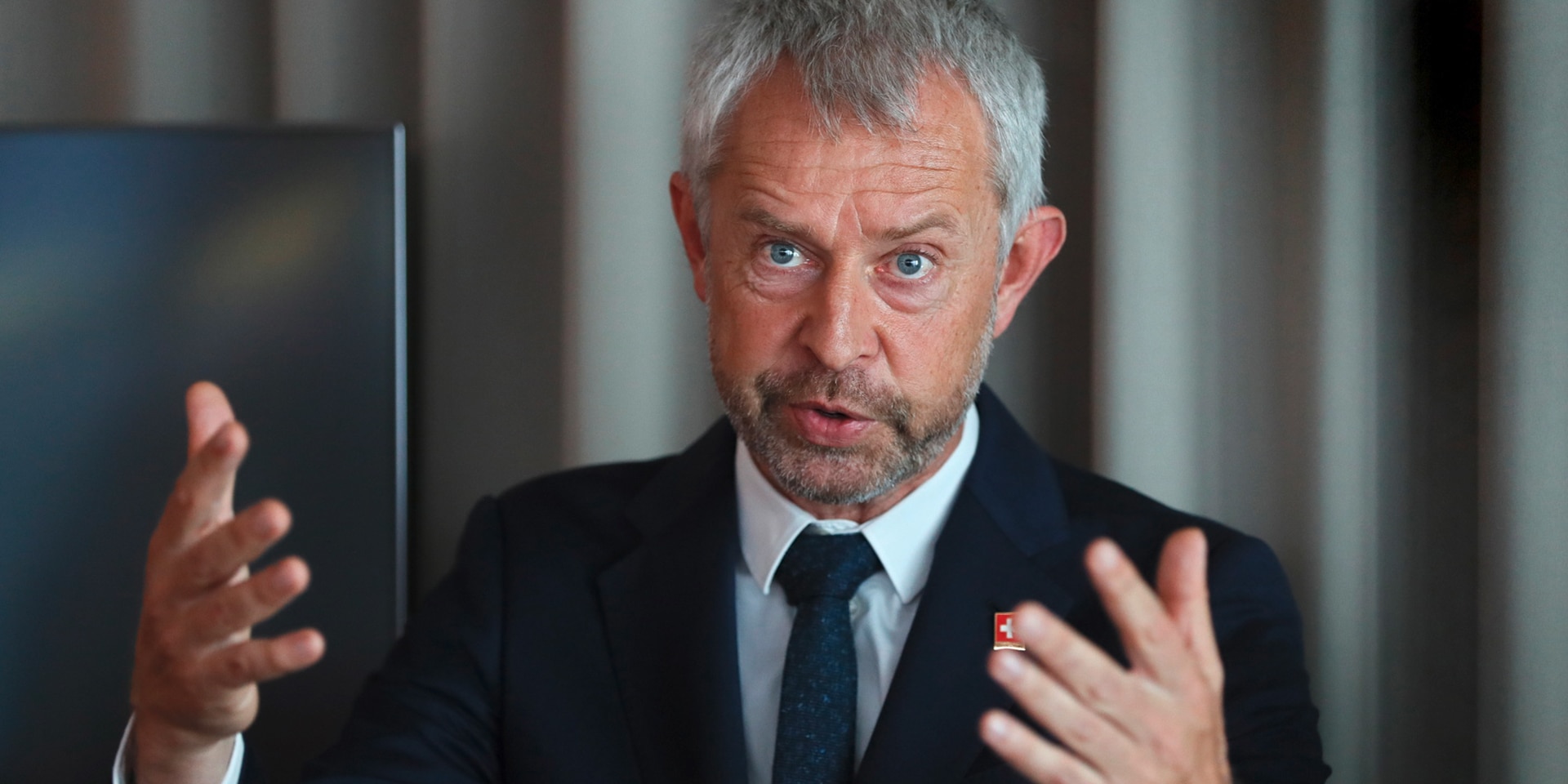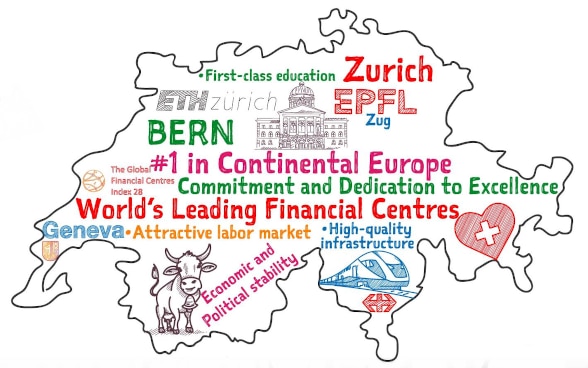Get to know Switzerland at a travelling pop-up venue – or only a click away
To support its foreign policy objectives, Switzerland's communication must keep pace with the times. The Strategy for Communication Abroad 2021–24 meets this need by contributing to a positive and nuanced view of Switzerland abroad and promoting the country's interests. The strategy will achieve this with projects like the Pop-up House of Switzerland, which is inspired by the temporary stores favoured by millennials. It will stop off in various countries as well as maintaining an online presence.

Alongside tradition, innovation is part of Switzerland's DNA. International communication explains the country's strengths and promotes its interests abroad. © FDFA
Did you know that Switzerland is one of the most popular countries in the world for start-ups and new companies in the field of artificial intelligence? And that it's involved in various global programmes aimed at meeting the objectives of the 2030 Agenda? Innovation is as much a part of Switzerland's DNA as tradition. While the country's good offices, scenic beauty and quality products are among the many undisputed assets of its reputation abroad, a number of its strengths remain relatively unknown.
A positive image abroad can improve a country's diplomatic room for manoeuvre, its appeal as a base for organisations, and its exchanges in the fields of economics, science and tourism. This is where communication abroad comes into play: it explains a country's strengths, actions and interests while supporting coherent and effective foreign policy.
It is clear from current events that we live in an increasingly digital world, shaped by mass media and the need to respond flexibly to global challenges. Switzerland's Foreign Policy Strategy for the coming years has defined its thematic focus areas as peace and security, prosperity, sustainability, and digitalisation. The Strategy for Communication Abroad 2021–24, recently adopted by the Federal Council, is anchored in these focus areas. It establishes a course of action that aims to present Switzerland as an innovative, competitive and responsible country with a sense of solidarity. It will achieve this using public relations tools, including new platforms for dialogue and exchange, digital and physical meetings and activities, and collaborations with public and private partnersA positive image abroad can improve a country's diplomatic room for manoeuvre, its appeal as a base for organisations, and its exchanges in the fields of economics, science and tourism. This is where communication abroad comes into play: it explains a country's strengths, actions and interests while supporting coherent and effective foreign policy.
It is clear from current events that we live in an increasingly digital world, shaped by mass media and the need to respond flexibly to global challenges. Switzerland's Foreign Policy Strategy for the coming years has defined its thematic focus areas as peace and security, prosperity, sustainability, and digitalisation. The Strategy for Communication Abroad 2021–24, recently adopted by the Federal Council, is anchored in these focus areas. It establishes a course of action that aims to present Switzerland as an innovative, competitive and responsible country with a sense of solidarity. It will achieve this using public relations tools, including new platforms for dialogue and exchange, digital and physical meetings and activities, and collaborations with public and private partners.
Five priorities for Switzerland's image abroad

The areas of action identified in the new Strategy for Communication Abroad – innovation, the economy, Swiss-EU relations, the Swiss financial centre and sustainability – respond to the challenges posed by events including the COVID-19 pandemic.
Each of the five areas has a message to convey abroad: greater awareness of Switzerland as an efficient, competitive and cutting-edge hub of innovation and technology; better visibility for the Swiss economy and greater trust in Switzerland's brand; better recognition of Switzerland's efforts to combat tax evasion; greater understanding of Switzerland's solidarity with Europe and the positive impact of close Swiss-EU relations; and improved awareness of the Sustainable Development Strategy for achieving the objectives of the 2030 Agenda.
Collaborations with actors in the fields of politics, culture, science and the economy will play a vital role in delivering these messages. The paragraphs below offer an introduction to some of the innovative proposals and solutions featured in the Strategy for Communication Abroad.

Virtual and physical communication campaigns: from the Pop-up House of Switzerland to finance.swiss
The COVID-19 pandemic has brought Switzerland's economic development needs to the fore: products in the main export markets require greater visibility and attention. It has also clarified the importance of digital channels and hybrid solutions combining online communication and in-person encounters.
The Pop-up House of Switzerland was created in response to these considerations. Based on the pop-up stores favoured by millennials, the temporary venue will stop off for a few months at a time in key market countries – and particularly in the regions bordering Switzerland – to give people the opportunity to 'meet' Switzerland in person. Its first scheduled stop is in Stuttgart, the capital of Baden-Württemberg and one of the most economically important regions on the Swiss border. Here, the Pop-up House of Switzerland will act as a platform for meeting the public, as well as networking with private and public partners from a range of sectors including industry and research.
The campaign will also be supported by the Swiss Pavilion at the World Expo in Dubai in 2021, and by the House of Switzerland at the Tokyo Summer Olympic Games in 2021 and the Beijing Winter Olympic Games in 2022.
In the field of digital communication, finance.swiss is a new information platform for the Swiss financial centre that demonstrates the qualities of Switzerland's financial sector to an international public, as well as highlighting its strengths and innovative capabilities in the areas of fintech and sustainable finance.The Pop-up House of Switzerland was created in response to these considerations. Based on the pop-up stores favoured by millennials, the temporary venue will stop off for a few months at a time in key market countries – and particularly in the regions bordering Switzerland – to give people the opportunity to 'meet' Switzerland in person. Its first scheduled stop is in Stuttgart, the capital of Baden-Württemberg and one of the most economically important regions on the Swiss border. Here, the Pop-up House of Switzerland will act as a platform for meeting the public, as well as networking with private and public partners from a range of sectors including industry and research.
The campaign will also be supported by the Swiss Pavilion at the World Expo in Dubai in 2021, and by the House of Switzerland at the Tokyo Summer Olympic Games in 2021 and the Beijing Winter Olympic Games in 2022.
In the field of digital communication, finance.swiss is a new information platform for the Swiss financial centre that demonstrates the qualities of Switzerland's financial sector to an international public, as well as highlighting its strengths and innovative capabilities in the areas of fintech and sustainable finance.

From tradition to innovation: Switzerland's changing image
Over the years, Switzerland has generally enjoyed a very positive and stable image among the public abroad. This is confirmed by the surveys Presence Switzerland regularly conducts in other countries, and by comparative international studies such as the Nation Brands Index, which places Switzerland in the top ten every year.
However, there is room to improve awareness of Switzerland's innovative capability; other countries currently associate it more with tradition than innovation. The launch of the SwissTech campaign in 2018 offers a success story in this field: it initiated a collaboration between the public and private sectors that marked out new technologies as a key topic of Swiss foreign policy. Working primarily at international technology fairs, the SwissTech campaign promotes Switzerland's interests at the heart of the world of technology, bolstering the perception of Switzerland as an innovative economic hub and increasing the visibility of Swiss companies and universities abroad.
Coverage on media and social media is another important indicator of how a country is perceived abroad. The Swiss financial centre is a frequently cited topic here, enjoying a better reputation than it did ten years ago and often attracting interest for its innovative capability in particular – for example in the fintech and sustainable finance sectors.
It is still too soon to assess how Switzerland's image will emerge from the COVID-19 pandemic, however. This will primarily depend on how it is perceived abroad, how it compares globally, and how well it succeeds in tackling the economic, social and health-related challenges of the crisis.
Communication abroad will continue to play an active role in shaping international perceptions of Switzerland and optimising its positioning on the world stage, ensuring it remains a key element of the country's foreign policy in the years to come.



